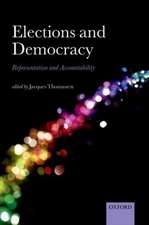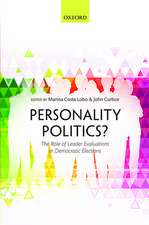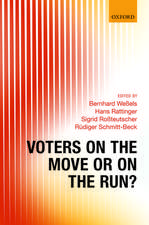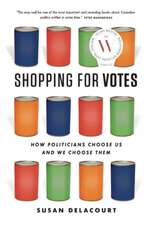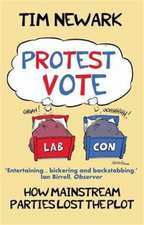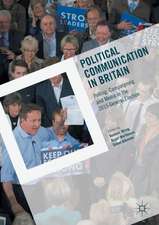Passages to the Presidency: From Campaigning to Governing
Autor Charles O Jonesen Limba Engleză Paperback – iun 1998
The standard view of the transition is based on a distinction between campaigning and governing, with election day as the marker: campaigning before, preparing to govern after. Yet changes are blurring the distinction between the two activities. The Clinton transition in 1992 is the watershed case. Dubbed the "worst" for failing to meet many of the standard tests, Clinton and his aides, nevertheless, were attuned to a campaigning style of governing that was fine-tuned after the 1994 mid-term election.
Future transitions will be judged by a revised set of expectations. The conventional rules will be supplemented by tests that account for campaigning as integral to governing. What is called the "permanent campaign" is upon us. Presidents in the 21st century will prepare to govern more publicly from the start, anxious to establish and enhance their status in a more communal style of governing.
This book considers the critical ten weeks of transition for recent party changes in the White House (Nixon, Carter, Reagan, Clinton) and signals a pivotal change for the future. Charles Jones identifies the conventional expectations for an effective transition in regard to such topics as dismantling the campaign, connecting with Congress, establishing a theme, and relating to the press.
Future transitions will be judged by a revised set of expectations. The conventional rules will be supplemented by tests that account for campaigning as integral to governing. What is called the "permanent campaign" is upon us. Presidents in the 21st century will prepare to govern more publicly from the start, anxious to establish and enhance their status in a more communal style of governing.
This book considers the critical ten weeks of transition for recent party changes in the White House (Nixon, Carter, Reagan, Clinton) and signals a pivotal change for the future. Charles Jones identifies the conventional expectations for an effective transition in regard to such topics as dismantling the campaign, connecting with Congress, establishing a theme, and relating to the press.
Preț: 197.97 lei
Nou
Puncte Express: 297
Preț estimativ în valută:
37.88€ • 39.65$ • 31.53£
37.88€ • 39.65$ • 31.53£
Carte tipărită la comandă
Livrare economică 31 martie-14 aprilie
Preluare comenzi: 021 569.72.76
Specificații
ISBN-13: 9780815747130
ISBN-10: 0815747136
Pagini: 242
Ilustrații: black & white illustrations
Dimensiuni: 152 x 229 x 18 mm
Greutate: 0.32 kg
Editura: Brookings Institution Press
Colecția Brookings Institution Press
ISBN-10: 0815747136
Pagini: 242
Ilustrații: black & white illustrations
Dimensiuni: 152 x 229 x 18 mm
Greutate: 0.32 kg
Editura: Brookings Institution Press
Colecția Brookings Institution Press
Notă biografică
Charles O. Jones is a nonresident senior fellow in Governance Studies at the Brookings Institution, the Hawkins Professor of Political Science (emeritus) at the University of Wisconsin, and a former president of the American Political Science Association. His books include Clinton and Congress, 1993-96 (University of Oklahoma Press, 1999) and Passages to the Presidency (Brookings, 1998).
Descriere
The standard view of the transition is based on a distinction between campaigning and governing, with election day as the marker: campaigning before, preparing to govern after. Yet changes are blurring the distinction between the two activities. The Clinton transition in 1992 is the watershed case. Dubbed the "worst" for failing to meet many of the standard tests, Clinton and his aides, nevertheless, were attuned to a campaigning style of governing that was fine-tuned after the 1994 mid-term election.
Future transitions will be judged by a revised set of expectations. The conventional rules will be supplemented by tests that account for campaigning as integral to governing. What is called the "permanent campaign" is upon us. Presidents in the 21st century will prepare to govern more publicly from the start, anxious to establish and enhance their status in a more communal style of governing.
This book considers the critical ten weeks of transition for recent party changes in the White House (Nixon, Carter, Reagan, Clinton) and signals a pivotal change for the future. Charles Jones identifies the conventional expectations for an effective transition in regard to such topics as dismantling the campaign, connecting with Congress, establishing a theme, and relating to the press.
Future transitions will be judged by a revised set of expectations. The conventional rules will be supplemented by tests that account for campaigning as integral to governing. What is called the "permanent campaign" is upon us. Presidents in the 21st century will prepare to govern more publicly from the start, anxious to establish and enhance their status in a more communal style of governing.
This book considers the critical ten weeks of transition for recent party changes in the White House (Nixon, Carter, Reagan, Clinton) and signals a pivotal change for the future. Charles Jones identifies the conventional expectations for an effective transition in regard to such topics as dismantling the campaign, connecting with Congress, establishing a theme, and relating to the press.

